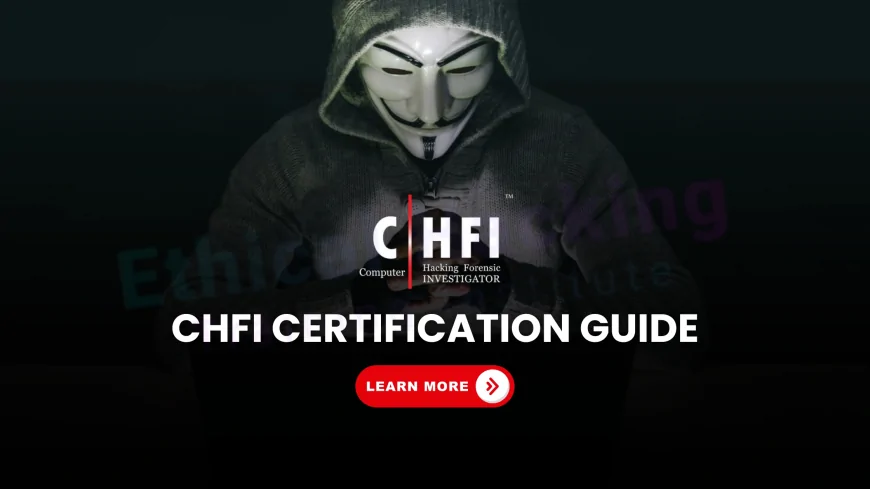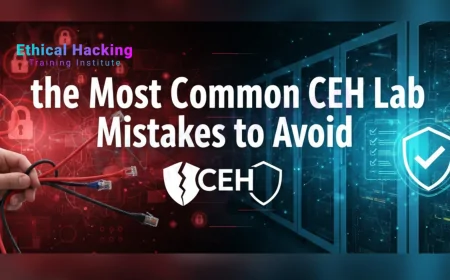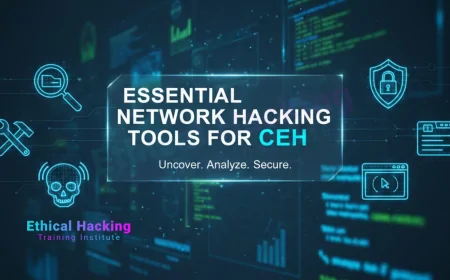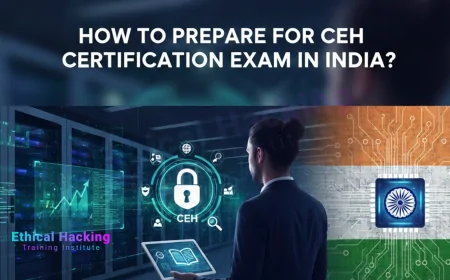CHFI Certification Training: A Comprehensive Guide to Getting Certified | How to Get CHFI Certified: Complete Training and Preparation Guide
Learn everything about CHFI certification training in this comprehensive guide—eligibility, training types, course modules, labs, exam prep, cost, and career benefits. Get certified in digital forensics with confidence.

Table of Contents
- Introduction
- What Is CHFI Certification?
- Importance of CHFI in Today’s Cybersecurity
- Eligibility & Prerequisites
- Training Pathways
- CHFI Course Structure & Modules
- Types of Training: Self‑Paced vs Live vs Corporate
- Hands‑on Labs & Forensics Tools
- Exam Preparation Strategies
- CHFI Exam Details
- Cost of CHFI Training & Certification
- Career Paths After CHFI
- Salary & ROI
- Top CHFI Training Providers
- Common Training Challenges & Solutions
- Renewal & Continuing Education
- Tips to Maximize Your Training
- Student Testimonials
- FAQs
- Conclusion
Introduction
In a world where cyber threats escalate daily, the need for skilled digital forensic professionals has never been greater. The Certified Hacking Forensic Investigator (CHFI) credential offered by EC-Council equips professionals with the knowledge, skills, and tools to detect cyberattacks, collect digital evidence, and effectively respond. This comprehensive guide covers everything from training options, tools, exam preparation, career impact, to frequently asked questions.
What Is CHFI Certification?
The CHFI certification validates expertise in collecting reliable digital evidence following international forensic standards. It covers areas such as operating system forensics, network and mobile device analysis, malware forensics, cloud-based investigations, and legal compliance.
Importance of CHFI in Today’s Cybersecurity
-
Rising Cybercrime: Organizations face ransomware, data breaches, and insider threats daily.
-
Legal Requirements: Forensics professionals must follow chain-of-custody standards for court-admissible evidence.
-
High Demand: CHFI holders are sought by law enforcement, SOCs, government agencies, and enterprises.
Eligibility & Prerequisites
| Criterion | Requirement |
|---|---|
| Experience | 1–2 years in Law Enforcement, IT, or Security |
| Training | Recommended but optional if experience suffices |
| Technical Knowledge | Networking, OS fundamentals, basic scripting |
| Exam Prerequisite | None; training recommended for clear understanding |
Training Pathways
You have multiple options:
-
Self‑Study
-
Based on official CHFI books, online guides, and forums.
-
-
Self‑Paced eLearning
-
Video modules, labs, quizzes, and support inclusion.
-
-
Live Instructor‑Led Training
-
Real‑time guidance and cohort-based learning.
-
-
Corporate/Group Training
-
Custom programs tailored for teams with labs and interaction.
-
CHFI Course Structure & Modules
CHFI v10 is structured around 14 module blocks:
-
Forensic Fundamentals
-
Investigation Process
-
Hard Disks & File Systems
-
Evidence Collection
-
Anti‑Forensics Techniques
-
OS Forensics
-
Network Forensics
-
Web Application Forensics
-
Database Forensics
-
Cloud Forensics
-
Malware Forensics
-
Email Crime Forensics
-
Mobile Device Forensics
-
Reporting & Legal Issues
Each module includes theory, labs, and case-based scenario exercises.
Types of Training: Self‑Paced vs Live vs Corporate
| Type | Pros | Cons |
|---|---|---|
| Self‑Paced | Flexible, cost‑effective | Requires discipline |
| Live Training | Interactive, guided | Higher cost, fixed schedule |
| Corporate Training | Custom, team‑oriented | Schedule constraints |
Hands‑on Labs & Forensics Tools
Practical application is key. Common platforms and tools:
-
EC‑Council iLabs: Virtual forensic environments.
-
Autopsy/The Sleuth Kit: File system analysis.
-
EnCase, FTK: Commercial forensic suites.
-
Wireshark, TCPdump: Packet analysis.
-
Volatility: Memory forensics.
-
X-Ways, Cellebrite: Mobile forensics..
Labs simulate real incidents—ransomware breach, data exfiltration, log auditing—to cement skills.
Exam Preparation Strategies
-
Follow the official EC‑Council CHFI blueprint.
-
Complete lab exercises module-by-module.
-
Take mock exams under timed conditions.
-
Join community groups—Reddit, LinkedIn, TechExams.
-
Use mnemonics, flashcards for concepts.
-
Revisit difficult areas with extra labs.
CHFI Exam Details
-
Code: 312-49 (ANSI)
-
Format: 150 Multiple‑Choice Questions
-
Duration: 4 Hours
-
Passing Score: ~70% (Adaptable)
-
Delivery: Pearson VUE center or online proctoring via iProctor
Cost of CHFI Training & Certification
| Component | Estimate (USD) |
|---|---|
| Self‑Paced Training | $700–$1,200 |
| Live Training | $1,200–$2,000 |
| Exam Voucher | $650–$950 |
| Practical Exam (Optional) | $500–$600 |
| Retake | $250–$499 |
| Study & Labs | $100–$300 |
| Total Range | $1,500–$3,300+ |
Career Paths After CHFI
-
Digital Forensics Analyst
-
Incident Response Specialist
-
Security Operations Center (SOC) Engineer
-
Cyber Crime Investigator
-
IT Forensics Auditing Professional
Salary & ROI
Average salaries vary by region:
-
USA: $85,000–$130,000/year
-
UK: £45,000–£75,000/year
-
India: ₹7–₹20 Lakhs/year
A strong return on training and certification costs.
Top CHFI Training Providers
WebAsha Technologies
Located in Wadgaon Sheri / Chandan Nagar, WebAsha is an EC‑Council-authorized institute offering CHFI training with a strong emphasis on practical labs, real-world case studies, and flexible batch schedules. They’ve earned recognition for their expert instructors and job-focused curriculum.
Choosing the Right Provider: What to Look For
| Factor | Description |
|---|---|
| Accreditation | Choose EC‑Council–authorized trainers to ensure official certification validity. |
| Labs & Tools | Hands-on experience using forensic tools like Autopsy, FTK, EnCase, Wireshark, Volatility, etc. |
| Trainer Experience | Look for instructors with real-world cybersecurity and forensics backgrounds. |
| Batch Flexibility | Options for weekday, weekend, fast-track, or self-paced learning. |
| Student Feedback | High pass rates, strong support in emerging topics, and placement assistance are key. |
Next Steps
-
Visit their websites to review syllabus, demo classes, and schedule.
-
Ask for an info session or trial lab access to evaluate their teaching and infrastructure.
-
Compare packages: do they include exam vouchers, retake options, or job placement support?
-
Check batch formats to align with your availability—online/live or classroom-based.
Common Training Challenges & Solutions
-
Tool familiarity: Resolve with frequent lab practice.
-
Time management: Use a structured schedule/milestone method.
-
Legal knowledge: Reinforce with legal case studies and regulations.
-
Technical jargon: Maintain a glossary for key terms.
Renewal & Continuing Education
CHFI certification is valid for 3 years. Maintain it by:
-
Earning 120 ECE Credits via webinars, conferences, or advanced courses.
-
Publishing articles or whitepapers in forensic topics.
-
Attending EC-Council events for credit points.
Tips to Maximize Your Training
-
Start labs early—even before deep theory study.
-
Join forensic Discord groups for peer support.
-
Use real-world cases from law enforcement/trials.
-
Keep a forensic toolkit ready (VMs & tool downloads).
-
Document learning with notes, mind maps, videos.
-
Conduct mock incidents at home VM labs.
Student Testimonials
“CHFI training gave me the confidence to handle real forensic investigations at my SOC team.” — Ravi M., Security Analyst
“Through labs and live training, I could master forensic tools and passed the exam on the first attempt.” — Emma T., Cyber Crime Investigator
Frequently Asked Questions (FAQs)
1. What does CHFI stand for?
CHFI stands for Certified Hacking Forensic Investigator, offered by EC-Council.
2. Is CHFI suitable for beginners?
Yes, if you have basic IT and networking knowledge. Training is designed to build skills from ground up.
3. How long does CHFI training take?
Typically 4–6 weeks full-time or 2–3 months part-time, depending on format and pace.
4. Do I need hands-on experience?
Not required before training, but practical labs are essential during training to understand concepts.
5. Is there a CHFI practical exam?
Yes, it is optional and validates real-world forensic problem-solving in a live lab.
6. How many questions are on the exam?
The exam contains 150 multiple‑choice questions.
7. What is the passing score?
You must score approximately 70%, but it may vary slightly.
8. How much does CHFI training cost?
Ranges from $700 for self-paced to $2,000 or more for instructor-led courses.
9. What tools will I use?
Tools include Autopsy, EnCase, FTK, Wireshark, Volatility, Cellebrite, among others.
10. Are labs mandatory?
Yes, labs are crucial for applying techniques in simulated investigation scenarios.
11. Can I take the exam online?
Yes, exams are available via online proctoring or at Pearson VUE test centers.
12. How long is the CHFI certification valid?
It’s valid for three years and requires 120 ECE credits for renewal.
13. Are there recertification requirements?
Yes, you must earn continuing education credits or retake modules to renew your badge.
14. Is CHFI recognized globally?
Yes, it is accepted by government, military, financial, and corporate sectors worldwide.
15. What careers can CHFI lead to?
Jobs include Forensic Analyst, Incident Responder, Cybercrime Investigator, SOC Lead.
16. Can I prepare for CHFI on my own?
Yes. Self-study with books, labs, and online resources is effective with dedication.
17. Which is better: self-paced or live training?
Depends on your learning style. Self-paced offers flexibility; live training provides guidance.
18. Is CHFI better than CEH?
CHFI focuses on forensics and investigation, while CEH focuses on offensive penetration testing. Both are complementary.
19. How does CHFI compare with GIAC certifications?
GIAC certifications like GCFA are advanced and more expensive. CHFI offers strong value and foundational forensics skills.
20. Where can I register for CHFI?
You can register through EC-Council or authorized training partners and schedule exams at Pearson VUE
Conclusion
CHFI certification represents an essential milestone in the digital forensics landscape. Through structured training, hands-on labs, consistent study, and strategic preparation, you can transition from novice to certified investigator. With its clear impact on career advancement, earning potential, and industry credibility, CHFI training is an investment with real-world rewards.
What's Your Reaction?
 Like
0
Like
0
 Dislike
0
Dislike
0
 Love
0
Love
0
 Funny
0
Funny
0
 Angry
0
Angry
0
 Sad
0
Sad
0
 Wow
0
Wow
0

















